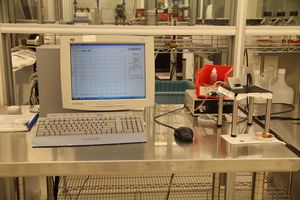Optical Film Thickness (Filmetrics): Difference between revisions
Jump to navigation
Jump to search
Content deleted Content added
Created page with "{{tool|{{PAGENAME}} |picture=Filmmetrics.jpg |type = Inspection, Test and Characterization |super= Tony Bosch |phone=(805)839-3918x217 |location=Bay ? |email=bosch@ece.ucsb.edu |…" |
tool decomissioned notice,locaiton="removed from lab" |
||
| (4 intermediate revisions by 3 users not shown) | |||
| Line 1: | Line 1: | ||
'''TOOL DECOMISSIONED - Used the [[Optical Film Thickness & Wafer-Mapping (Filmetrics F50)|<u>Filmetrics F50</u>]] instead. 2022-05-13''' |
|||
{{tool|{{PAGENAME}} |
{{tool|{{PAGENAME}} |
||
|picture=Filmmetrics.jpg |
|picture=Filmmetrics.jpg |
||
|type = Inspection, Test and Characterization |
|type = Inspection, Test and Characterization |
||
|super= |
|super= Ning Cao |
||
|phone=(805)839-3918x217 |
|phone=(805)839-3918x217 |
||
|location= |
|location=REMOVED FROM LAB |
||
|email=bosch@ece.ucsb.edu |
|email=bosch@ece.ucsb.edu |
||
|description = |
|description = Thin-Film Reflectometry |
||
|manufacturer = [http://www.filmetrics.com/ Filmetrics] |
|manufacturer = [http://www.filmetrics.com/ Filmetrics] |
||
|model = Filmetrics F20 |
|||
|materials = |
|materials = |
||
}} |
}} |
||
= |
=About= |
||
This tool is for thickness and optical property measurements of films on substrates. The technique used is white light reflection. Data is taken with normal incidence reflection of white light (400 nm – 850 nm) from the surface. The data is modeled and the optical parameters are adjusted to give a best least-squared fit to the data. The accuracy of the technique will depend on the thickness of the film and the optical models used for the fitting of the data. For a more complete description go to [http://www.filmetrics.com/ Filmetrics]. |
This tool is for thickness and optical property measurements of films on substrates. The technique used is white light reflection. Data is taken with normal incidence reflection of white light (400 nm – 850 nm) from the surface. The data is modeled and the optical parameters are adjusted to give a best least-squared fit to the data. The accuracy of the technique will depend on the thickness of the film and the optical models used for the fitting of the data. For a more complete description go to [http://www.filmetrics.com/ Filmetrics]. |
||
=Equipment Specifications= |
=Equipment Specifications= |
||
*400-850 nm reflection spectrum |
*400-850 nm reflection spectrum |
||
*150 A to 50 um thickness only measurement |
*150 A to 50 um thickness only measurement |
||
Latest revision as of 14:27, 13 May 2022
TOOL DECOMISSIONED - Used the Filmetrics F50 instead. 2022-05-13
|
About
This tool is for thickness and optical property measurements of films on substrates. The technique used is white light reflection. Data is taken with normal incidence reflection of white light (400 nm – 850 nm) from the surface. The data is modeled and the optical parameters are adjusted to give a best least-squared fit to the data. The accuracy of the technique will depend on the thickness of the film and the optical models used for the fitting of the data. For a more complete description go to Filmetrics.
Equipment Specifications
- 400-850 nm reflection spectrum
- 150 A to 50 um thickness only measurement
- 1000 A to 10 um thickness, n, and k measurements
- 1 nm accuracy at 500 nm thickness
- Manual wafer placement
- Data can all be saved
- Can model up to three layers
